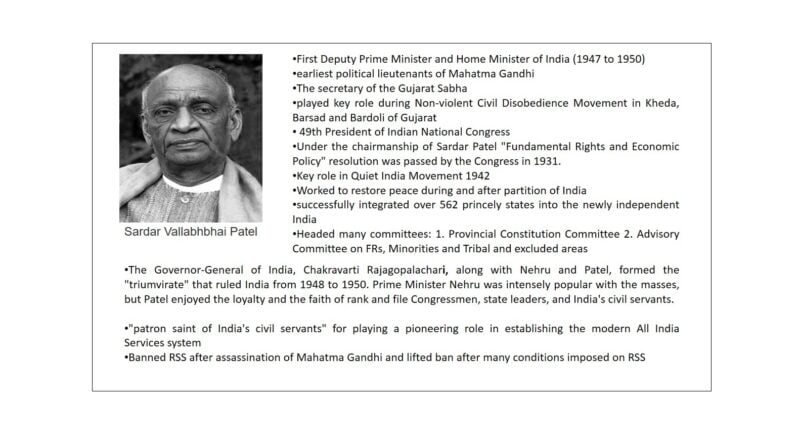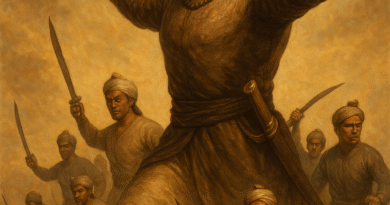Sardar Vallabhbhai Patel: The Iron Man of India
Sardar Vallabhbhai Patel, often referred to as the “Iron Man of India,” was a prominent figure in the country’s struggle for independence and one of the chief architects of the unified, post-independence India. His legacy is an inspiration to millions, as he played a crucial role in shaping the nation’s destiny during a tumultuous period in its history.
Contents
Life Summary of Sardar Vallabhbhai Patel
- First Deputy Prime Minister and Home Minister of India (1947 to 1950)
- earliest political lieutenants of Mahatma Gandhi
- The secretary of the Gujarat Sabha
- played key role during Non-violent Civil Disobedience Movement in Kheda, Barsad and Bardoli of Gujarat
- 49th President of Indian National Congress
- Under the chairmanship of Sardar Patel “Fundamental Rights and Economic Policy” resolution was passed by the Congress in 1931.
- Key role in Quiet India Movement 1942
- Worked to restore peace during and after partition of India
- successfully integrated over 562 princely states into the newly independent India
- headed many committees: 1. Provincial Constitution Committee 2. Advisory Committee on FRs, Minorities and Tribal and excluded areas
- The Governor-General of India, Chakravarti Rajagopalachari, along with Nehru and Patel, formed the “triumvirate” that ruled India from 1948 to 1950. Prime Minister Nehru was intensely popular with the masses, but Patel enjoyed the loyalty and the faith of rank and file Congressmen, state leaders, and India’s civil servants.
- “patron saint of India’s civil servants” for playing a pioneering role in establishing the modern All India Services system
- Banned RSS after assassination of Mahatma Gandhi and lifted ban after many conditions imposed on RSS
Early Life and Education:
Vallabhbhai Jhaverbhai Patel was born on October 31, 1875, in a small village in Nadiad, in the western Indian state of Gujarat. He came from a humble background, but his parents recognized his potential and supported his education. He studied law in England, returning to India in 1913, and began practicing as a barrister.
Role in India’s Freedom Struggle:
Sardar Patel was drawn into the Indian freedom struggle during the early 20th century, and he quickly established himself as a prominent leader. He actively participated in various movements, including Mahatma Gandhi’s non-cooperation and civil disobedience movements. His unwavering commitment to India’s independence and his astute political acumen made him a central figure in the Indian National Congress.
Leader and Unifier:
One of Sardar Patel’s most remarkable achievements was his role in the integration of over 562 princely states into the newly independent India. After the British withdrawal in 1947, these princely states had the option to join either India or Pakistan, or to remain independent. Patel’s diplomatic skills and unwavering determination were instrumental in persuading the majority of these states to join India, which significantly contributed to the territorial integrity and unity of the country.
Legacy and Impact:
Sardar Vallabhbhai Patel’s legacy is enduring and multifaceted. His contributions to India’s freedom struggle, his pivotal role in the integration of princely states, and his selfless dedication to the service of the nation have left an indelible mark on the country’s history. Patel’s leadership, pragmatism, and vision for a united India continue to inspire leaders and citizens alike.
“Manpower without Unity is not a strength unless it is harmonized and united properly, then it becomes a spiritual power.”
Sardar Vallabhbhai Patel’s Contribution to the Indian Constituent Assembly
While the Constituent Assembly was a diverse gathering of brilliant minds and leaders, one towering figure who played a significant role in its proceedings was Sardar Vallabhbhai Patel. His contributions to this historic assembly were instrumental in shaping the foundation of modern India.
1. Integration of Princely States:
Before delving into Patel’s role within the Constituent Assembly, it is essential to recognize his prior accomplishments. As India’s Deputy Prime Minister and Minister of Home Affairs, Patel had successfully integrated over 562 princely states into the newly independent India. This monumental task was executed with precision and tact, demonstrating Patel’s determination to create a unified and cohesive nation. His diplomatic skills and commitment to national unity laid the groundwork for the Constituent Assembly’s work.
2. Advocacy for a Unified India:
Within the Constituent Assembly, Sardar Patel remained a staunch advocate for a strong, unified, and centralized Indian state. He argued that the country’s diversity should be celebrated within a single, sovereign nation rather than by creating multiple autonomous regions. Patel’s vision aligned with his earlier efforts in integrating the princely states and was a driving force behind the assembly’s commitment to a strong center within the federal structure of the Indian Constitution.
3. Key Role in Drafting Fundamental Rights and Directive Principles:
Sardar Patel was a member of the Assembly’s Fundamental Rights Committee, which was tasked with drafting the section of the Constitution that guarantees essential civil liberties to the citizens of India. Patel’s contributions to this committee were substantial, and his ideas were instrumental in shaping the fundamental rights enshrined in the Indian Constitution. He believed that these rights were crucial in safeguarding individual liberties, ensuring social justice, and maintaining the integrity of the nation.
REFER : Making of the Constitution
4. Commitment to Secularism and Inclusivity:
Sardar Patel was an ardent supporter of secularism and inclusivity in the Constitution. He believed in a vision of India that respected the diverse religious and cultural traditions of the country. His commitment to secularism is evident in the Preamble of the Indian Constitution, which emphasizes justice, liberty, equality, and fraternity – values that underpin the idea of a secular and inclusive nation.
5. Emphasis on Administrative Efficiency:
Patel’s experiences as the first Deputy Prime Minister and Minister of Home Affairs made him acutely aware of the need for an efficient administrative structure. He advocated for a strong, centralized government to ensure that the new nation could address its challenges effectively and efficiently. His views significantly influenced the formation of the Constitution’s federal structure, which maintains a balance between the powers of the central government and the states.
Sardar Vallabhbhai Patel’s contributions to the Indian Constituent Assembly were instrumental in shaping the principles and foundations of the Indian Constitution. His unwavering commitment to national unity, individual liberties, and inclusivity left a lasting imprint on the document that continues to guide and govern the world’s largest democracy. As India celebrates its democratic values and diversity, it is essential to remember the role played by the “Iron Man of India” in this historic endeavor. Sardar Vallabhbhai Patel’s legacy lives on through the Constitution he helped create and the united, diverse nation he worked tirelessly to build.
Source: Britannica
Discover more from Simplified UPSC
Subscribe to get the latest posts sent to your email.

